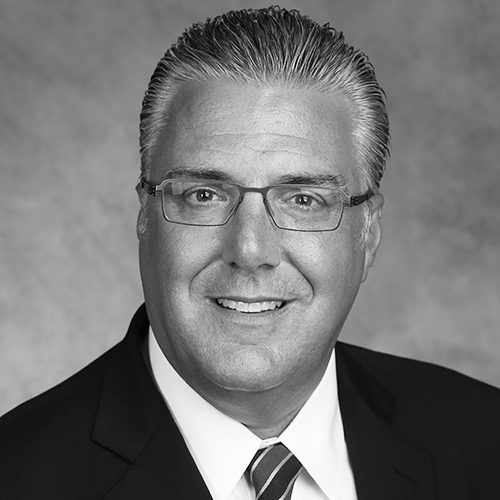If ever there was a lawyer whose background and skills perfectly matched his job, that lawyer is Mark Nielsen. The Harvard-educated Nielsen is general counsel of Norwalk, Connecticut-based Frontier Communications, a regional telecom company providing landline voice, video, and high-speed Internet services in parts of twenty-nine states.
After stints as a senior in-house lawyer at Raytheon Company and then Praxair, Inc., Nielsen joined Frontier as general counsel in March 2014. At Frontier, he assumed responsibility for all of the company’s legal affairs, including litigation, intellectual property, corporate governance, and SEC compliance.
But what placed Nielsen immediately in the center of the action was his background in mergers and acquisitions. Just prior to his arrival, the company had announced an agreement to acquire AT&T’s landline business in Connecticut for $2 billion. Nielsen helped close that deal in October 2014, and then immediately shifted to negotiating an even larger buy: the acquisition of Verizon’s landline operation in southern California, central Texas, and the Tampa Bay, Florida, region for $10.5 billion in cash and assumed debt.
“Our transaction with Verizon involved enormous complexities—legal, regulatory, financial, technological, and operational—and I am proud of the critical role played by Frontier’s legal department in each of these areas,” Nielsen says. “There was literally a year between a sign and close, so the operating covenants with respect to how the seller would operate the property that we’d be acquiring were especially important. It was a massive team effort.”
The deal included not only the merger of three Verizon operating subsidiaries into Frontier, but also a multifaceted series of financing transactions. Frontier financed the purchase price through a combination of a registered offering of common and convertible preferred stock, a delayed-draw Term Loan A, and a Rule 144 offering of three series of unsecured senior notes.
“It’s important to be business partners. That’s my philosophy of what an in-house legal department needs to be in helping with a large transaction.”
Nielsen’s legal team on the Verizon transaction received high marks for its collaboration with key leaders throughout the business. He was especially proud of a note he received after the closing from Timothy Travaille, leader of the company’s integration team, thanking him for the role played by his and his team of “friendly lawyers,” Nielsen says.
“Tim Travaille’s thank-you note represented an important achievement for us,” he says. “Too often it seems that lawyers are seen as those who say no and obstruct things that need to get done.” The note in essence said that the members of Nielsen’s in-house legal team were, instead, constructive, helping the company get to yes with Verizon and solving a number of complex integration issues and challenges.
“It’s important to be business partners,” he says. “That’s my philosophy of what an in-house legal department needs to be in helping with a large transaction.”
After successfully handling all legal aspects of the Verizon transaction, the next chapter of Nielsen’s Frontier journey commenced on January 1, 2017, when executive vice president Kathleen Abernathy, a former commissioner of the Federal Communications Commission, announced her retirement as leader of the company’s regulatory affairs function. Abernathy’s responsibilities were added to Nielsen’s portfolio, and once again, he found himself thrust into a role for which he was perfectly suited.
Nielsen’s background has a significant political dimension. In the 1990s, he served six years in the Connecticut General Assembly—one term in the state House of Representatives followed by two terms in the Senate.
After a political hiatus, he also served as Mitt Romney’s legal counsel and then chief of staff when Romney was governor of Massachusetts. As legal counsel, Nielsen provided advice on legal aspects of policy decisions, drafted legislation and executive orders, and served as the governor’s principal advisor on judicial appointments. As chief of staff, Nielsen was responsible for the administration’s policy and legislative initiatives, as well as overseeing the daily operations of state government.
Nielsen’s experience in the political arena has served him well at Frontier, allowing him to seamlessly assume responsibility for Frontier’s regulatory affairs at the state and federal level. And once again, Nielsen’s timing has been excellent.
“A new party and president assuming power in Washington, DC, translates into a bigger role for governmental relations than if Hillary Clinton had won,” he says.
Nielsen foresees significantly more support for the landline industry from the Trump administration, particularly in rural America, where Trump performed well in the election and Frontier has a strong presence.
“Some very basic issues of telecommunications policy are now open to reconsideration at the FCC,” Nielsen says. “It’s a very exciting time for us and it presents an opportunity for us to accomplish things we wouldn’t have dreamed of even recently a few months ago. Obviously, the landline industry is challenged, as each landline company has to figure out how to provide better, faster service in rural parts of the country, and we think that the new administration will have a greater appreciation for that.”
Reflecting on his first three years at Frontier, Nielsen says that he has landed in a “dream job” and is proud to be part of such an outstanding legal team.
“In the span of three short years, I have helped plan and execute the sort of transformative acquisitions that most lawyers can only imagine, and I am now delighted to be working to influence important components of federal telecom policy at exactly the right moment,” Nielsen says. “Today, my role is the perfect combination of my passions—and I could not be more grateful for the opportunities I have been given at Frontier.”
Mayer Brown is a leading law firm with offices across the Americas, Asia, Europe, and the Middle East. The firm is known for its ability to address the most demanding legal challenges worldwide.

